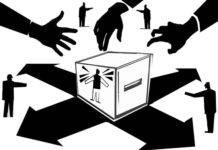The Awami League would have won the 10th parliamentary elections anyway, even if all the political parties contested, so says a survey by a US-based organisation.
Funded jointly by the US and the UK, the Democracy International conducted the survey across Bangladesh after the polls.
Around 42.7 percent voters would have cast their vote for the Awami League, it found.
Boycotted by the opposition BNP and its partners, the polls resulted in a predictable landslide for the ruling party and its allies.
The Jan ’14 survey titled ‘Post Election Environment’ used the ‘Multi-staged random sampling’ method to chose participants.


bdnews24.com on Sunday received a copy of the outcomes of the survey funded by the USAID and UKAID.
The participants were asked: “Let’s assume that the last January 5 election was fully participatory, which political party do you think you would vote for?”
Of the participants, 35 percent said they would have voted for the BNP, 10.3 percent wanted to keep their decision secret, 3.6 percent chose the Jatiya Party, while 1.6 percent preferred Jamaat-e-Islami had it contested.
Jamaat’s registration with the Election Commission had been declared illegal and void by the High Court last year, just months before the polls.
40.7 percent vote cast
Around 23 percent of the participants said they had gone to the polling stations. Only 40.7 percent voters from areas where ballot papers were used in voting had gone to cast their ballots.
Asked why they did not go to vote, 15 percent respondents said they supported the polls boycott by the BNP and its allies, another 15 percent said they did not have the candidate of their choice and 12 percent cited security concerns.

As many as 21 people had died in polls-related violence on Jan 5.
Only 2.7 percent said they did not exercise their franchise as they felt it was a ‘farce poll’.
When asked about the main reason for casting votes, 38 percent cited their wishes to exercise their voting rights, 35 percent said they voted out of their responsibilities as citizen while 19 percent said they wanted to vote for their favourite party or candidate.
Four percent claimed they had been forced to cast ballots.
‘Main problem’
Responding to the question as to what was Bangladesh’s three biggest problems, 72 percent respondents said it was political instabilities. Corruption was chosen by 43 percent and 32 percent went for under-developed infrastructure.
Nine percent of those surveyed believed the Jan 5 election was one of three main problems.
Over 10 percent did not consider the absence of a dialogue between the two leading parties as a problem.
Dawdling equation
On whether Bangladesh was on the right track or not, 29 percent said ‘yes’. Sixty-nine percent said it was heading in the wrong direction and two percent respondents were unsure.
However, 53 percent of the Awami League supporters believe Bangladesh was moving in the ‘correct’ direction while only nine percent of the BNP supporters agreed.
Forty-five percent of the participants from Barisal Division were most optimistic about the ongoing issues in Bangladesh. But respondents from Rajshahi were the least optimistic at 18 percent.
Those optimistic cited the development in the education sector as a reason for relief.
Ten percent considered the trials of suspected war criminals as one of the main reasons to be optimistic.
Of those who consider the country’s situation miserable, 89 percent viewed political conflict as the reason.
Only four percent thought the war crimes trials as one of the reasons.
Source: bdnews24










